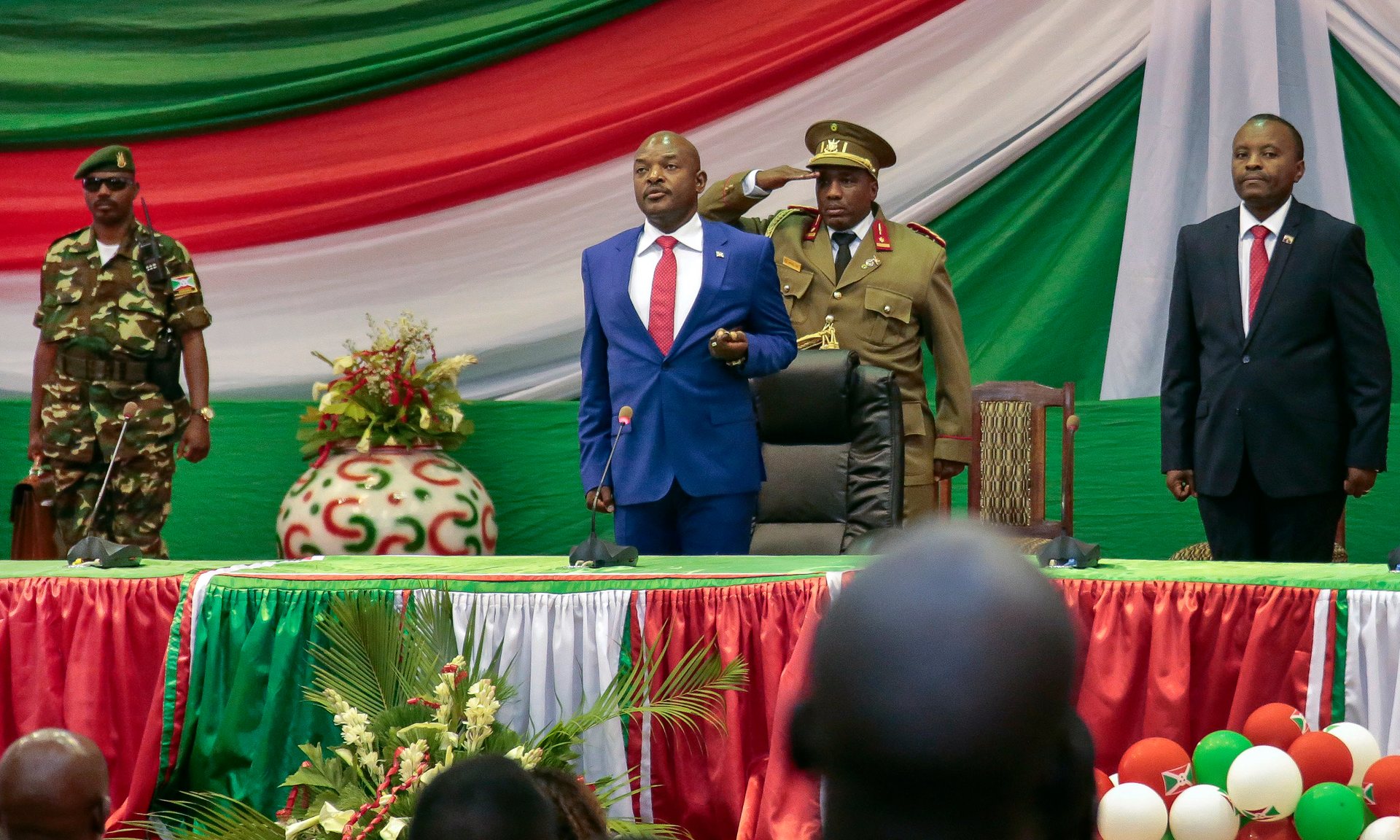Burundi’s government announced the “unexpected death” of the president, saying that he had died following cardiac arrest. Nkurunziza had been president of the smaller neighbour to the DRC, Uganda and Tanzania since 2005.
“The Government of the Republic of Burundi announces with great sadness the unexpected death of His Excellency Pierre Nkurunziza, President of the Republic of Burundi… following a cardiac arrest on June 8, 2020,” the government said in a tweet on Tuesday.
Burundi’s government declared a week of mourning following his death.

Photograph: Gildas Ngingo/AP
Change of presidents was already pending
Nkurunziza’s death comes just weeks before he was due to officially step down following Evariste Ndayishimiye’s electoral victory last month. A former army general, Ndayishimiye became the president-elect after winning the candidacy for Nkurunziza’s ruling party, the Hutu nationalist CNDD-FDD.
Indeed, Nkurunziza’s 15 years in office had been marred throughout by allegations of human rights abuses and muzzling of the press, as well as the stifling of critics and opposition.
Even after handing over power, Nkurunziza was widely expected to remain in control from behind the scenes and exactly how power would be divided in the country remained unclear.
“That’s a question that does not need posing anymore,” Thierry Vircoulon, a Burundi expert at the International Crisis Group, told DW. “The new president of the old regime will have a completely free hand.”
Civil war rebel
From 1993 Burundi endured a 12-year civil war that killed some 300,000 people and was driven by similar ethnic tensions to those witnessed in the 1994 genocide in neighbouring Rwanda.
During that civil war, Nkurunziza fought in the rebel Hutu group that went on to become the African country’s ruling party, the CNDD-FDD.
He initially held the position of a minister in a transitional government in 2003 but when the conflict came to an end, Nkurunziza earned a number of CNDD-FDD victories in votes held through June and July of 2005, ultimately leading to him being appointed president that August.
He was reelected in 2010 with more than 91% of the vote, albeit with the opposition boycotting that election.
He won a controversial third term in 2015 that left Burundi in turmoil as supporters and opponents of Nkurunziza disputed whether it was constitutional for him to seek a third term. Hundreds died and hundreds of thousands fled the ensuing violence.
In 2018, he said he would not seek a fourth term in May’s election.
Facing allegations of widespread abuses, his government steadfastly rejected scrutiny, becoming the first nation to withdraw from the International Criminal Court in 2017. The government said it made the move as it sought greater sovereignty from what it believed an institution biased towards the West.
‘Remember all the victims of the regime’
That decision was met with derision, however, from activists who mourned a significant blow to international justice. The activists were aware of the court’s decision to investigate violence in Burundi and cited this as the principal reason for the government’s decision to withdraw.
The International Criminal Court in The Hague in 2017 had started an investigation into alleged crimes against humanity committed in Burundi or by nationals of Burundi outside the country.
For human rights activist Pierre Claver Mbonimpa, who survived an attack carried out on behalf of the Nkurunziza regime, the president’s death puts a question mark on the investigation.
“When a person dies criminal charges are no longer investigated,” Mbonimpa told DW. “That is what hurts me. We were waiting for justice but that is going to be difficult now.”
He added that investigations into other members of Nkurunziza’s regime would continue.
“I remember all the victims of the regime, not only the victims of Pierre Nkurunziza but the entire regime,” he said. “Everyone who committed crimes needs to be criminally investigated. That cannot be allowed to end just because Nkurunziza has died.”
Hutu and born-again Christian
Nkurunziza was born in 1964 to a wealthy family and hailed from Burundi’s majority Hutu ethnic group.
After high school, he had ambitions of becoming an army officer or an economist, but this was impossible due to the restrictions imposed on the Hutu majority by the then ethnic Tutsi government. As a result, Nkurunziza became a sports teacher.
He joined the Hutu rebellion in 1995 as Burundi found itself deep in the midst of civil war and Nkurunziza took solace in religion after he was badly wounded in the leg during the conflict. During that time he began having visions of himself as a future president while hiding out in remote swamps.
“Nkurunziza indeed believes he is president by divine will… and he, therefore, organizes his life and government around these values,” presidential spokesman Willy Nyamitwe once claimed.
Nkurunziza spent at least half of every week travelling with his football team Alleluia FC and his choir “Komeza gusenga” which means “pray non-stop” in the local language of Kirundi.

